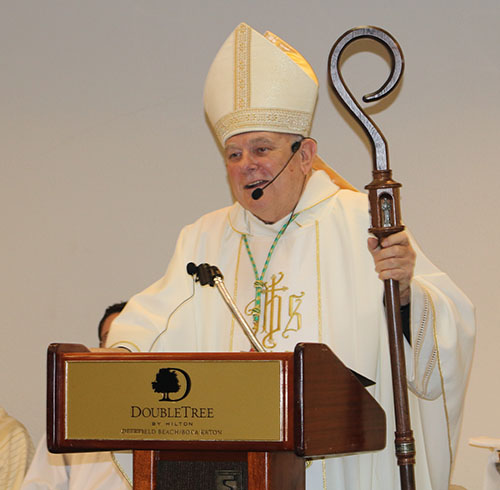By Archbishop Thomas Wenski - The Archdiocese of Miami
Archbishop Thomas Wenski preached this homily while celebrating the vigil Mass for the third Sunday of Easter with members of the Miami Archdiocesan Council of Catholic Women, gathered for their annual convention, April 30, 2022, in Deerfield Beach.
It is always a joy for me to be with you to celebrate Mass – whether here in South Florida or in Tallahassee. And it is certainly a joy to come together – in person – after two years of being at a distance because of the pandemic that has disrupted our lives. We pray for those whom the disease took from us, for the families that still mourn the loss of loved ones, and for those who were sick – and those who still are sick because of the virus. While not everyone was infected, all of us were affected.

Photographer: LINDA REEVES | FC
Archbishop Thomas Wenski celebrates Mass on the second day of the Miami Archdiocesan Council of Catholic Women's 62nd annual convention, held April 29-May 1, 2022, in Deerfield Beach. At left is Father Michael Greer, spiritual advisor to the MACCW.
The first reading and the Gospel reading puts the figure of Peter front and center. In the Acts of Apostles, Peter is preaching and healing people – with some success – to the point that he and the other apostles were called on the carpet by the Sanhedrin.
Peter is “rock-solid” in his resolve to preach the name of Jesus Christ.
“We must obey God rather than men.” “And they rejoice because they had been found worthyto suffer dishonor for the sake of the name.”
That’s quite a difference from Holy Thursday evening, after Jesus’ arrest, when they all abandoned him with Peter denying him three times while warming himself next to a charcoal fire. And it is still quite a distance from the shores of the Sea of Tiberias when Peter and the others returned to what they knew before Jesus: being fishermen. The Risen Lord once again makes his presence felt and reminds them that they are no longer mere fishermen but fishers of men.
Now, next to another charcoal fire, Peter has the chance to walk back his betrayal. (It’s interesting that the gospels only mention a charcoal fire twice: once in the courtyard where Peter denied knowing Jesus and now along the seashore where Peter affirms that he loves Jesus.)
Do you love me? Jesus ask Peter. (You know, in Italian, it is translated: Mi ami?)
In any case, before Jesus asked Peter or even us this question, he went to a lot of trouble to first assure us that he really does loves us. He died making the point. Knowing that he has loved us first should make it easier for us to say that we do love him too.
But when Peter professes his love of Jesus, Jesus commissions him to care for the flock, to feed the sheep. Loving the Lord is always a charge to care for others.
Our Catholic faith is more than just narcissistic navel gazing or an over-simplified sentimentalism. It is not a self-absorbed seeking after self-fulfillment found through esoteric teachings or practices. Our faith invites to look outward and beyond.
And in doing so, we often must stretch ourselves – going beyond our comfort levels and sometimes making others a bit uncomfortable. That certainly was the case with the Sanhedrin. They weren’t comfortable with the Apostles preaching the name of Jesus and ordered the Apostles to stop teaching the name of Jesus.
The Sanhedrin today are those who would tell us to shut up by telling us that religion is private and that we have no right to impose our views on others. Religion – and our faith in Jesus Christ – is certainly personal but not private and we don’t impose, we propose. “To obey God rather than men” today demands that we do not capitulate on issues regarding the sanctity of human life – from conception till natural death. “To obey God rather than men” we resist those who would compel us to approve sexual practice and behavior that denies or contradicts the truth about marriage and family.
Opening our hearts to others and their needs – recognizing Jesus in the person of the prisoner, the migrant, the hungry – is an opportunity for each one of us for salvation and blessedness.
As I said that question of Jesus, “Do you love me?”, is also directed to each of us. And like Peter warming himself by the charcoal fire in the courtyard, we may have denied him knowing him. But now Jesus addresses us by the seashore. He is more interested in our future than our past; he does not take up time with bitter recrimination.
Do you love me? Then, follow me.

